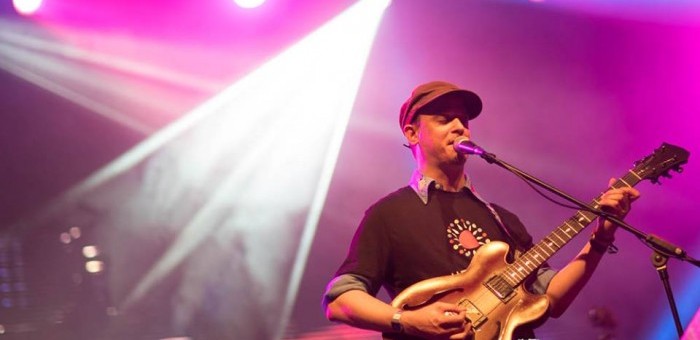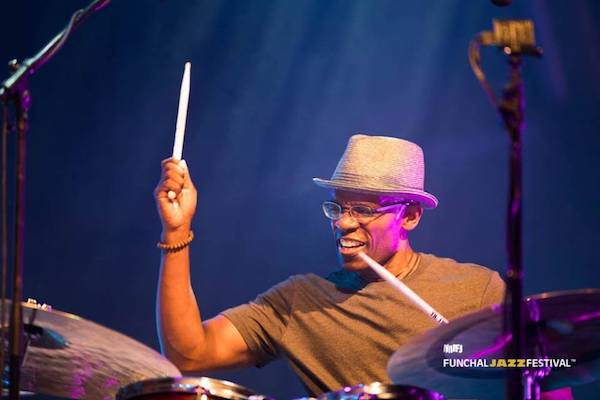Jan 13, 2026 2:09 PM
More Trump-Kennedy Center Cancellations
The fallout from the renaming of the John F. Kennedy Center for the Performing Arts to include President Donald…

Kurt Rosenwinkel performs during the Funchal Jazz Festival in Madeira, Portugal.
(Photo: Courtesy Funchal Jazz Festival/Facebook)On Markowitz’ self-descriptively titled “Points,” whose refrain evoked essences of Shorter’s “Nefertiti,” each member of the band improvised on different material within the “score,” prodded at every moment by McBee and Hart, who was conjuring Elvinistic refractions. Liebman developed a fragmentary line with his singular tone, varying the texture on a haunting, abstract solo; Lovano and Osby engaged in several choruses of erudite conversation, eventually joined by Liebman.
After Liebman announced that his “Partition” would “feature us in different combinations,” he and Lovano essayed a wood flute/flute duo. Markowitz signified on the piano strings; McBee and Hart played rubato. Every gesture was meaningful. The flow morphed into a succession of duos: blue soulfulness from Lovano and McBee; wild shapes by Liebman and Hart on wire brushes; atonal meditations by Osby and Markowitz, then further three-way dialog.
Lovano’s “Visitation” opened with the composer in another meditative passage alongside McBee and Hart, who entered a mind-reading space that they sustained as each member stepped up to say their piece, before Hart summarized with his own solo. McBee offered a lengthy introduction to John Coltrane’s late composition “Seraphic Light,” on which the horns played wisps of melody, evoking uncanny stillness. They worked their way into the melody, collectively crescendoing to intense heights and winding down back to stillness. By now it was close to 1 a.m., and the road warriors, anticipating a 4 a.m. lobby call en route to their next stop, took many bows to acknowledge a long ovation.
Night two opened with drummer Rudy Royston’s trio with his partners on the 2016 CD Rise Of Orion (Greenleaf)—Yasushi Nakamura on bass and Jon Irabagon on tenor and sopranino saxophone. Their unfailingly equilateral orientation made evident that Royston, a design-master who has played on six of JD Allen’s trio albums for High Note since 2008, has had much time to think about operating in the trio context. It began with “Petite One,” which Royston launched with quiet mallet strokes on his toms and cymbals. Irabagon played long notes with beautiful tone, developing the melody as Royston sound-painted with phrases that Nakamura completed. On “Man O To,” he extrapolated a tick-tock rhythm into a freebop line fulcrumed by Nakamura’s mighty vamp, over which Irabagon developed cogent variations, continually changing timbre in response to Royston’s beat permutations.
Nakamura opened the refrain of Henry Purcell’s “Dido And Aeneas” with a long, soulful solo that showcased his huge sound, incorporating double stops that Irabagon mirrored on tenor with multiphonic passages on which he authoritatively controlled the overtones. Irabagon, now on sopranino, opened “Sister Mother Clara” a cappella with carefully calibrated buzzing bee sounds, then essayed Roscoe Mitchell-esque parallel lines before transitioning to consonant melody-making over Royston’s wirebrushed snare-drum strokes in ways that evoked Charles Brackeen with Paul Motian’s 1970s trio.

Rudy Royston (Photo: Courtesy Funchal Jazz Festival)
Royston mixed Elvin Jonesish rolling thunder with Max Roach-esque designs on a blues reminiscent of 1961–’62 Coltrane; his solo built from simple figures on each component into a complex structure. Irabagon, on tenor, opened “Rise Of Orion” with a six-note motif before Royston entered warp gear, creating complex patterns that Nakamura’s impeccable basslines complemented—Irabagon developed a coruscating, impeccably executed statement. Irabagon switched back to sopranino for the encore, Bill Withers’ “Make A Smile For Me,” enveloping the folk-like melody with a tenderness that suited the title. As on each selection of this masterful set, Royston provided the armature, infusing the flow with his personality with a minimum of fuss.
A half-hour later, guitarist Kurt Rosenwinkel took the stage with his recently formed Caipi band, which has been touring since March behind Rosenwinkel’s CD release of that same name (Heartcore Records/RazDaz Recordz), on which he plays all the instruments and sings his own lyrics, framed with elemental melodies spun from high harmonic DNA, memorable hooks and pan-Brazilian beats..
For live performance, Rosenwinkel has assembled a young, tight unit of strong instrumentalists (Pedro Martins, guitar, keyboards, vocals; Olivia Trummer, piano, keyboards, vocals; Frederico Heliodoro, electric bass, vocals; Bill Campbell, drums; António Loureiro, percussion, vocals) who, at least on this concert, privileged impeccable part playing over interactive jazz impulses to complement Rosenwinkel’s succession of lustrous sui generis guitar inventions that signified on the messages of his songs, which he rendered in the light, keening tenor that is his fan base knows intimately from his self-accompaniment on innumerable solos over the years.
Rosenwinkel’s soundman was not on-site, and the guitarist’s singing—often in unison with Martins—was less prominent in the mix than it could have been. Campbell and Loureiro were locked-in throughout, continually creating striking textures, feeding off Heliodoro’s consistently percolating basslines. As strong as the charts were, several instrumental moments remain in this listener’s memory. One was Rosenwinkel’s a cappella introduction to “Time Machine,” on which he evoked an organ-like texture, before putting his sweet tenor to work on an English-language lyric (“You say you want to know where your life will go ...”) that he complemented with a concise, burnished solo.
Another was “Kama,” a well-crafted song in Portuguese, on which the leader integrated electronics into the flow of his elegant declamation; another was the sixth number, a ballad, which Trummer launched with an anthemic, classically infused cadenza, then sang in harmony with the leader, prefacing his resonant, melody-drenched solo. DB

Belá Fleck during an interview with Fredrika Whitfield on CNN.
Jan 13, 2026 2:09 PM
The fallout from the renaming of the John F. Kennedy Center for the Performing Arts to include President Donald…

Peplowski first came to prominence in legacy swing bands, including the final iteration of the Benny Goodman Orchestra, before beginning a solo career in the late 1980s.
Feb 3, 2026 12:10 AM
Ken Peplowski, a clarinetist and tenor saxophonist who straddled the worlds of traditional and modern jazz, died Feb. 2…

The success of Oregon’s first album, 1971’s Music Of Another Present Era, allowed Towner to establish a solo career.
Jan 19, 2026 5:02 PM
Ralph Towner, a guitarist and composer who blended multiple genres, including jazz — and throughout them all remained…

Rico’s Anti-Microbial Instrument Swab
Jan 19, 2026 2:48 PM
With this year’s NAMM Show right around the corner, we can look forward to plenty of new and innovative instruments…

Richie Beirach was particularly renowned for his approach to chromatic harmony, which he used to improvise reharmonizations of originals and standards.
Jan 27, 2026 11:19 AM
Richie Beirach, a pianist and composer who channeled a knowledge of modern classical music into his jazz practice,…